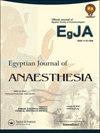求助PDF
{"title":"右美托咪定镇静降低COVID-19肺炎机械通气患者房颤发生率:一项随机对照试验","authors":"A. M. Fetouh, Motaz Amr Abu Sabaa, A. Aboelezz, A. Elbadry","doi":"10.1080/11101849.2023.2205210","DOIUrl":null,"url":null,"abstract":"Background: Atrial fibrillation (AF) is a cardiac complication commonly associated with COVID-19 infection, especially in severe cases. The sedative agent dexmedetomidine is known to cause bradycardia. In this study, we are testing whether dexmedetomidine could reduce the occurrence of AF in mechanically ventilated COVID-19 patients. Method(s): This prospective trial included 144 patients who were randomly allocated to one of two groups: Group C patients were sedated with propofol and fentanyl. Group D patients were sedated with the same medications in addition to dexmedetomidine infusion. Result(s): Demographic, clinical, and cardiac characteristics of all patients did not significantly differ between the two groups. The duration of intensive care unit (ICU) stay was comparable between the two groups. However, both propofol and fentanyl consumption significantly declined in Group D. The number of AF attacks showed a significant decline in association with dexmedetomidine administration (mean = 12.5% in Group D vs. 29.2% in Group C). Dexmedetomidine also reduced the amount of required electrical cardioversion episodes. Additionally, antiarrhythmic medication needed reduced significantly in Group D. Mortality rates did not differ between the two study groups (58.3% and 63.8% in Groups D and C, respectively). Conclusion(s): Dexmedetomidine is associated with a significant reduction in the burden of AF in patients with severe COVID-19 infection, manifested by fewer AF attacks, the need for electrical cardioversion shocks, and the consumption of antiarrhythmic medication without impact on mortality.Copyright © 2023 The Author(s). Published by Informa UK Limited, trading as Taylor & Francis Group.","PeriodicalId":11437,"journal":{"name":"Egyptian Journal of Anaesthesia","volume":" ","pages":""},"PeriodicalIF":0.6000,"publicationDate":"2023-05-01","publicationTypes":"Journal Article","fieldsOfStudy":null,"isOpenAccess":false,"openAccessPdf":"","citationCount":"0","resultStr":"{\"title\":\"Dexmedetomidine sedation reduces the incidence of atrial fibrillation in mechanically ventilated patients with COVID-19 pneumonia: A randomized controlled trial\",\"authors\":\"A. M. Fetouh, Motaz Amr Abu Sabaa, A. Aboelezz, A. Elbadry\",\"doi\":\"10.1080/11101849.2023.2205210\",\"DOIUrl\":null,\"url\":null,\"abstract\":\"Background: Atrial fibrillation (AF) is a cardiac complication commonly associated with COVID-19 infection, especially in severe cases. The sedative agent dexmedetomidine is known to cause bradycardia. In this study, we are testing whether dexmedetomidine could reduce the occurrence of AF in mechanically ventilated COVID-19 patients. Method(s): This prospective trial included 144 patients who were randomly allocated to one of two groups: Group C patients were sedated with propofol and fentanyl. Group D patients were sedated with the same medications in addition to dexmedetomidine infusion. Result(s): Demographic, clinical, and cardiac characteristics of all patients did not significantly differ between the two groups. The duration of intensive care unit (ICU) stay was comparable between the two groups. However, both propofol and fentanyl consumption significantly declined in Group D. The number of AF attacks showed a significant decline in association with dexmedetomidine administration (mean = 12.5% in Group D vs. 29.2% in Group C). Dexmedetomidine also reduced the amount of required electrical cardioversion episodes. Additionally, antiarrhythmic medication needed reduced significantly in Group D. Mortality rates did not differ between the two study groups (58.3% and 63.8% in Groups D and C, respectively). Conclusion(s): Dexmedetomidine is associated with a significant reduction in the burden of AF in patients with severe COVID-19 infection, manifested by fewer AF attacks, the need for electrical cardioversion shocks, and the consumption of antiarrhythmic medication without impact on mortality.Copyright © 2023 The Author(s). Published by Informa UK Limited, trading as Taylor & Francis Group.\",\"PeriodicalId\":11437,\"journal\":{\"name\":\"Egyptian Journal of Anaesthesia\",\"volume\":\" \",\"pages\":\"\"},\"PeriodicalIF\":0.6000,\"publicationDate\":\"2023-05-01\",\"publicationTypes\":\"Journal Article\",\"fieldsOfStudy\":null,\"isOpenAccess\":false,\"openAccessPdf\":\"\",\"citationCount\":\"0\",\"resultStr\":null,\"platform\":\"Semanticscholar\",\"paperid\":null,\"PeriodicalName\":\"Egyptian Journal of Anaesthesia\",\"FirstCategoryId\":\"1085\",\"ListUrlMain\":\"https://doi.org/10.1080/11101849.2023.2205210\",\"RegionNum\":0,\"RegionCategory\":null,\"ArticlePicture\":[],\"TitleCN\":null,\"AbstractTextCN\":null,\"PMCID\":null,\"EPubDate\":\"\",\"PubModel\":\"\",\"JCR\":\"Q3\",\"JCRName\":\"ANESTHESIOLOGY\",\"Score\":null,\"Total\":0}","platform":"Semanticscholar","paperid":null,"PeriodicalName":"Egyptian Journal of Anaesthesia","FirstCategoryId":"1085","ListUrlMain":"https://doi.org/10.1080/11101849.2023.2205210","RegionNum":0,"RegionCategory":null,"ArticlePicture":[],"TitleCN":null,"AbstractTextCN":null,"PMCID":null,"EPubDate":"","PubModel":"","JCR":"Q3","JCRName":"ANESTHESIOLOGY","Score":null,"Total":0}
引用次数: 0
引用
批量引用
Dexmedetomidine sedation reduces the incidence of atrial fibrillation in mechanically ventilated patients with COVID-19 pneumonia: A randomized controlled trial
Background: Atrial fibrillation (AF) is a cardiac complication commonly associated with COVID-19 infection, especially in severe cases. The sedative agent dexmedetomidine is known to cause bradycardia. In this study, we are testing whether dexmedetomidine could reduce the occurrence of AF in mechanically ventilated COVID-19 patients. Method(s): This prospective trial included 144 patients who were randomly allocated to one of two groups: Group C patients were sedated with propofol and fentanyl. Group D patients were sedated with the same medications in addition to dexmedetomidine infusion. Result(s): Demographic, clinical, and cardiac characteristics of all patients did not significantly differ between the two groups. The duration of intensive care unit (ICU) stay was comparable between the two groups. However, both propofol and fentanyl consumption significantly declined in Group D. The number of AF attacks showed a significant decline in association with dexmedetomidine administration (mean = 12.5% in Group D vs. 29.2% in Group C). Dexmedetomidine also reduced the amount of required electrical cardioversion episodes. Additionally, antiarrhythmic medication needed reduced significantly in Group D. Mortality rates did not differ between the two study groups (58.3% and 63.8% in Groups D and C, respectively). Conclusion(s): Dexmedetomidine is associated with a significant reduction in the burden of AF in patients with severe COVID-19 infection, manifested by fewer AF attacks, the need for electrical cardioversion shocks, and the consumption of antiarrhythmic medication without impact on mortality.Copyright © 2023 The Author(s). Published by Informa UK Limited, trading as Taylor & Francis Group.


